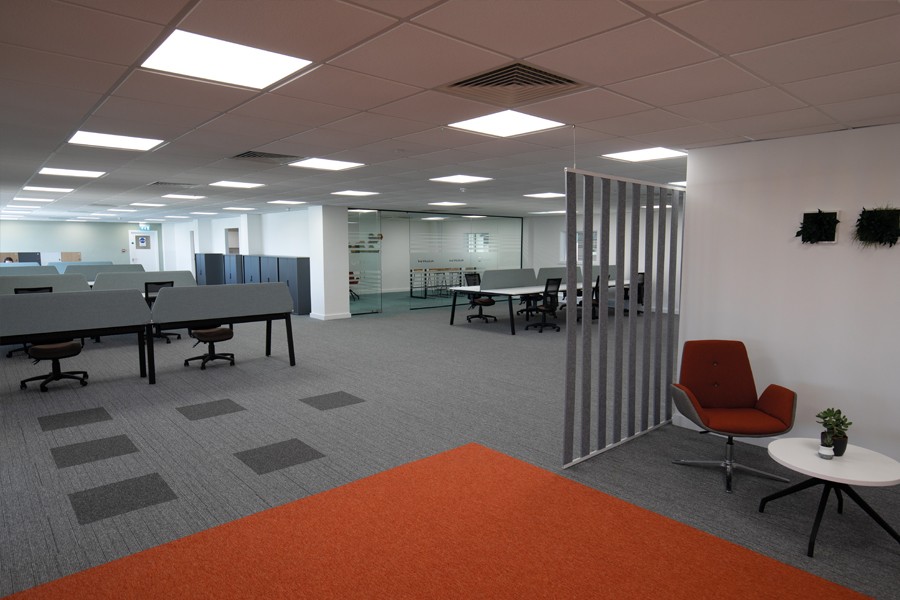WITH the shortage of construction materials in the UK continuing to impact the industry into 2022, how we build a more resilient and sustainable approach to procuring materials has been brought into sharp focus.
Contactors are well aware of this but as the construction sector has remained buoyant, have looked to source from suppliers who can respond to these changing market conditions.
Shaw Contract’s In Stock programme, developed in response to conditions which demand fast turnaround and serviced from its manufacturing base in Scotland, has seen demand grow through 2021. Many top-selling styles in 2021 were from In Stock collections. With yarn in stock, flexible credit terms and supply of product from Scotland to its customers, Shaw Contract has been able to offer customers a resilient solution. And it seems resilience proved a watchword for 2021.
For 2022, the move to a Circular Economy is seen as a major theme, and after Cop26 Glasgow in November 2021 the stage is set. The move requires fundamental changes to the way materials are sourced and products are designed, produced, sold, used, and disposed of.
Successfully closing, slowing, and narrowing resource loops often entails great amounts of planning and coordination that surpass organisational boundaries. Achieving a circular economy goes far beyond recycling.
Procurement of building materials will come under greater scrutiny, it is foreseen, with an emphasis on local supply coming to the forefront both from a sustainability and accessibility perspective.
As the world transitions towards a circular economy, the procurement department has many vital roles to play. For contractors this comes as no surprise as events such as the Covid-19 pandemic or the blockage of the Suez Canal have also made the vulnerability of many supply chains painfully obvious.
Challenges and opportunities
In summer 2021 strategy, transformation and innovation platform business, Insight Futures, whose founder Doug Morwood is known to readers of CFJ, undertook in association with Shaw Contract, a survey entitled: How might we de-risk the move to a circular economy for the built environment, in Scotland?
Shaw Contract as a supplier and manufacturer of flooring solutions, with a manufacturing base in Scotland, supported this survey to gain a deeper understanding of how it could work together with other stakeholders towards a circular economy.
At the time of the survey, 55% of respondents said they were experiencing material shortages, price fluctuations, or other disruption.
Meanwhile, how important is buying local and local service? Almost 40% of respondents indicated that local sourcing was very important, with an additional 35% saying it was extremely important.
Interestingly opinions were split on what influences some local sourcing.
While just over 40% agreed that construction procurement programmes positively impacted local sourcing from both a public and private sector viewpoint, 40% thought these programmes had a negative impact.
Conducted through interviews with key stakeholders across the built environment in Scotland during May-July 2021, the purpose of the survey: How might we de-risk the move to a circular economy for the built environment, in Scotland? was to establish current views of the value of the circular economy and its wider adoption in the built environment.
A key objective was to identify the motivations and barriers for the adoption of circular business models including how to create, deliver, and capture value to companies.
The survey also looked to explore the state of industry readiness in light of impending policy, regulation, and taxation change. Significant findings included:
- 80% of participants said circular economy was part of their organisational strategy, but the majority did not have a circular implementation plan
- 95% saw the need to change in circular economy project benefits being quantified
- Only 25% had an ongoing programme with one or more suppliers using circular economy principles; with the majority agreeing their organisation needed to transition or transform around circular-informed business planning and value propositions.
Understanding how to develop a circular economy strategy is seen as an important part of the development of the built environment and the local economy by bodies such as Scottish Enterprise.
Indeed, the Scottish Enterprise Cop26 Programme: Scotland’s Race to Zero, focused on the fact that businesses have a critical role to play in reducing emissions and delivering a just transition to net zero.
Meanwhile ‘Build Back Better’, government’s plan for growth, sets out plans to support growth through significant investment in infrastructure, skills and innovation, and comes with a vision to enable the transition to net zero in Britain.
The implications of this survey in Scotland, on how we might build back better throughout the UK, are significant. This will be explored further in 2022 through Phase 2 of Insight Futures and Shaw Contract’s initiative.
The ‘How might we de-risk the move to a circular economy for the built environment, in Scotland?’ survey is available – email infouk@shawcontract.com or visit the company website.
infouk@shawcontract.com
www.shawcontract.com


